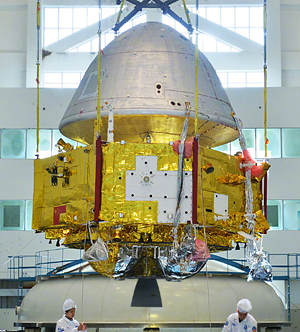CNSA is the China National Space Administration, the national space agency of China.
CNSA may also refer to:
CNSA is the China National Space Administration, the national space agency of China.
CNSA may also refer to:
In cryptography, key size or key length refers to the number of bits in a key used by a cryptographic algorithm.
CSS, or Cascading Style Sheets, is a language used to describe the style of document presentations in web development.
Isa or ISA may refer to:
DSA may refer to:
CSA may refer to:
FSA may refer to:

The China National Space Administration (CNSA) is a government agency of the People's Republic of China headquartered in Haidian, Beijing, responsible for civil space administration and international space cooperation. These responsibilities include organizing or leading foreign exchanges and cooperation in the aerospace field. The CNSA is an administrative agency under the Ministry of Industry and Information Technology.
SSA may refer to:
Tea is a beverage made from steeping the processed leaves, buds, or twigs of the tea bush in water.
NSA Suite B Cryptography was a set of cryptographic algorithms promulgated by the National Security Agency as part of its Cryptographic Modernization Program. It was to serve as an interoperable cryptographic base for both unclassified information and most classified information.
The Canadian Federation of Nurses Unions is a trade union centre in Canada. The CFNU is a federation of provincial unions representing nurses, nurse practitioners, student nurses, and various allied health care workers. It advocates on a national level for issues related to nurses, patient care, the health care system, and working conditions. As of 2023, the CNFU represents nearly 250,000 nurses and student nurses across Canada, who are members of the nine provincial nurses unions and Canadian Nursing Students’ Association.
The Inter-Agency Space Debris Coordination Committee (IADC) is an inter-governmental forum whose aim is to co-ordinate efforts to deal with debris in orbit around the Earth founded in 1993. The primary purposes of the IADC is information exchange on space debris research activities, facilitating opportunities for joint research, and reviewing progress of ongoing activities. All of these are designed to support identification of space debris mitigation options.

The State Administration of Science, Technology and Industry for National Defense is a civilian agency under the Chinese Ministry of Industry and Information Technology that is tasked with formulating policies, laws, and regulations regarding science, technology, and industry related to national defense. Established in 2008, its responsibilities extend to the coordination and promotion of the development of defense technology, overseeing China's space activities, and handling any international cooperation in these domains.
The Consultative Committee for Space Data Systems (CCSDS) was founded in 1982 for governmental and quasi-governmental space agencies to discuss and develop standards for space data and information systems. Currently composed of "eleven member agencies, twenty-eight observer agencies, and over 140 industrial associates," the CCSDS works to support collaboration and interoperability between member agencies through the establishment of data and system standards. According to the organisation's website, more than 1000 space missions have utilized data and systems standards created by CCSDS. The activities of the CCSDS are organized around six topic areas and composed of many working groups within the overall Collaborative Working Group Environment (CWE).

Tianwen-1 Chinese: 天问一号 is an interplanetary mission by the China National Space Administration (CNSA) which sent a robotic spacecraft to Mars, consisting of 6 spacecraft: an orbiter, two deployable cameras, lander, remote camera, and the Zhurong rover. The spacecraft, with a total mass of nearly five tons, is one of the heaviest probes launched to Mars and carries 14 scientific instruments. It is the first in a series of planned missions undertaken by CNSA as part of its Planetary Exploration of China program.

The Commercial National Security Algorithm Suite (CNSA) is a set of cryptographic algorithms promulgated by the National Security Agency as a replacement for NSA Suite B Cryptography algorithms. It serves as the cryptographic base to protect US National Security Systems information up to the top secret level, while the NSA plans for a transition to quantum-resistant cryptography.

The International Lunar Research Station (ILRS) (Chinese: 国际月球科研站) is a planned lunar base currently being led by Roscosmos and the China National Space Administration (CNSA). The ILRS will serve as a comprehensive scientific experiment base built on the lunar surface or in lunar orbit that can carry out multi-disciplinary and multi-objective scientific research activities including exploration and utilization, lunar-based observation, basic scientific experiment and technical verification, and long-term autonomous operation. Statements from Roscosmos and CNSA underline that the project will be "open to all interested countries and international partners."

Zhurong is a Chinese rover on Mars, the country's first to land on another planet after it previously landed two rovers on the Moon. The rover is part of the Tianwen-1 mission to Mars conducted by the China National Space Administration (CNSA).

The Planetary Exploration of China, also known as Tianwen, is the robotic interplanetary spaceflight program conducted by the China National Space Administration (CNSA). The program aims to explore planets of the Solar System, starting from Mars, and will be expanded to Jupiter and more in the future.